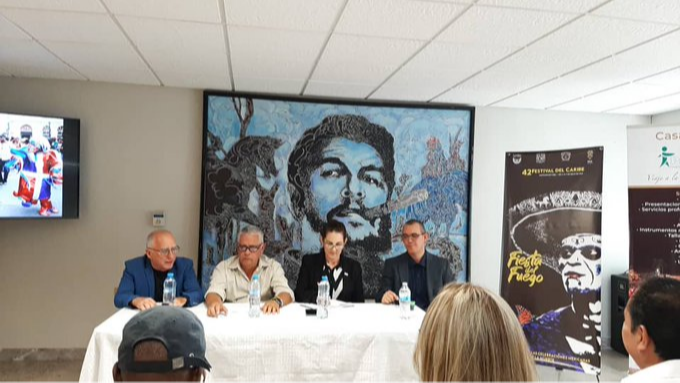
Photo: Prensa Latina.
Mexico City, May 3 (RHC)-- The 42nd edition of the Caribbean Festival, an event that takes place every year in the city of Santiago de Cuba, was presented in this capital by Orlando Vergés, director of the Casa del Caribe.
At a press conference at the Cuban embassy in Santiago, he informed that the Festival, also known as Fiesta del Fuego, will take place from July 3 to 9, with the support of the Ministry of Culture of our country and the government authorities in that eastern province.
The meeting will be dedicated to the Mexican celebrations of life and death, festivities that bring together the spirituality, magic, cultural diversity, history and material culture of this nation, which were declared Oral and Intangible Heritage of Humanity by UNESCO in 2003.
In the context of the Festival, the second edition of the World Congress on Death will be held, whose main motivation will be to delve deeper into this theme, a priority of the Caribbean Festival on this occasion.
According to the call for the event, during those days in Santiago de Cuba, Mexican studies on this celebration will be discussed, while specialists from other countries will share their research on death in a multidisciplinary sense.
Mexican celebrations of life and death, also known as Day of the Dead festivities, are one of the regional events that have reached world stature as they are carried out by the Mexican people.
Likewise, they are evidence of the particular relationship of the inhabitants of Latin America and the Caribbean with death and its festivities, moments in which the cultural resistance of its people is also expressed.
The Caribbean Festival is the space of greatest concentration and diversity of popular cultures and traditions of the peoples of the region, where exchange and defense of their identities take place at the same time.
Its extensive artistic program includes more than 20 stages with activities during the seven days of the event, where music, shows, colorful costumes and the cultures of various nations mingle, regardless of language, transforming Santiago de Cuba into the capital of all Caribbean people.

